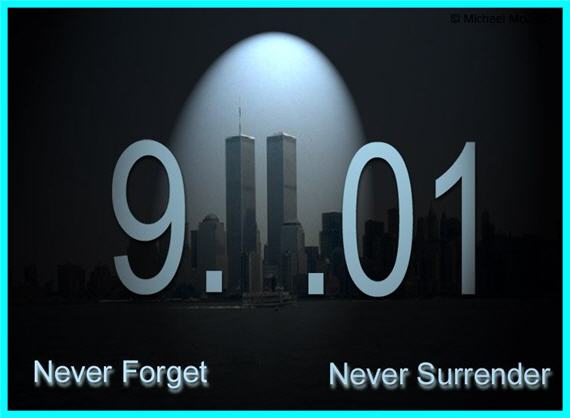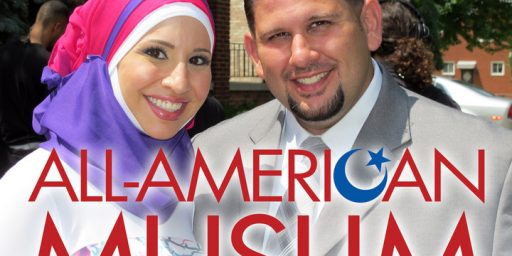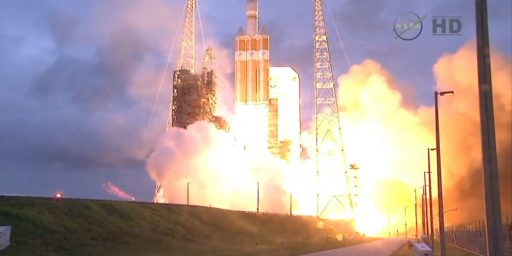College Campus 9/11 Commemorations
Are colleges teaching the right lessons about the 9/11 attacks?
Manhattan Institute’s Charlotte Allen charges that colleges are doing 9/11 commemorations wrong.
Unlike the commemorations in most of the rest of America, however, the academic commemorations for the most part won’t focus on, say, the 403 New York firefighters, paramedics, and police officers who died in rescue efforts at the World Trade Center towers hit by hijacked planes. Nor upon the numerous acts of courage and selflessness that marked that day, not least those of the passengers of United Airlines Flight 93, the flight that crashed in Pennsylvania, whose rallying cry “Let’s roll!” led by 32-year-old passenger Todd Beamer accompanied an effort to fight back against the terrorists. Nor upon the approximately 3,000 children who lost parents in the massacre, including dozens of babies born after their fathers perished. Least of all will there be much emphasis on what America did or should have done by way of reprisal for a brazen act of war that killed more people in the collapse of the World Trade towers alone (2,753) than perished in the Japanese attack on Pearl Harbor on December 7, 1941 (2,402).
Instead, the campus commemorations, many of which will be spaced out for days and even weeks this fall, will focus on, well, understanding it all, in the ponderous, ambiguity-laden, complexity-generating way that seems to be the hallmark of college professors faced with grim events about which they would rather not think in terms of morality: “Historical and political representations,” whatever those are (Harvard), “How do we determine truth and reality?” (more Harvard), and “Imaging Atrocity: The Function of Pictures in Literary Narratives about 9/11” (St. John’s University in New York).
And the topic that seems to demand the most understanding, at least in terms of the obsessive amounts of time and resources that college professors and administrators will be devoting to it, is Islam. There will be so many campus lectures, panel discussions, teach-ins, and photo exhibits devoted to the Muslim faith, Muslim communities in America, and the real or imagined violent acts against Muslims in the wake of 9/11 (there has actually been only one revenge-slaying since that date—of a man who turned out not to be a Muslim—and the perpetrator was convicted and executed) that if you had just rocketed in from Venus, you might think that Muslims had been the chief victims, not the sole perpetrators, of the massacre that day—as well as an estimated 67 alleged terrorism incidents or attempts in the United States during the decade that followed.
Even those these examples are certainly cherry picked, ignoring more “traditional” commemorations, none of this strikes me as problematic.
First off, I’m not sure that colleges really need to be commemorating 9/11 at all, at least in the classroom. We don’t generally spend a lot of lecture time remembering anniversaries. Pearl Harbor Day, the most obvious analogue, was never commemorated in any meaningful way during all the years I spent attending or teaching college. And that was on campuses in Real America, not the Communist Ivy League or at schools named after Catholic saints.
One could argue that 9/11 is different because it’s a contemporaneous event whose impact is still being felt directly. But the typical college student was somewhere between 7 and 12 years old at the time of 9/11. For many of them, it’s a pretty fuzzy memory.
Second, to the extent that the attacks are an important subject for academic analysis and discussion, it’s not about the acts of heroism of the first responders or the derring-do of Todd Beamer. Their valor should of course be recorded in history and passed down as shining examples of humanity at its best; it’s just not the sort of thing that college is about. Alvin York and Audie Murphie don’t get much coverage in lectures on the world wars, either.
No, professors will teach about the impact of the attacks in areas interesting to their fields of study. For security studies types like myself, the impact on counterterrorism, asymmetrical warfare, relations with Pakistan and the larger region, the transatlantic relationship, and all manner of related impacts of the attacks and their aftermath would be appropriate topics. There will indeed be humanities courses where the impact on public perceptions of Islam will be relevant topics.
For example, a freshman might well come to campus with half-baked thoughts like “Muslims were the perpetrators of the attacks.” It would be a disservice for them to graduate without understanding that the attacks were actually perpetrated by 19 particular Muslims who were part of a terrorist organization motivated by a mixture of radical theology and a set of policy goals and that the world has some 2.25 billion Muslims, very few of whom are interested in blowing them up.
Via Allen McDuffee







Instead, the campus commemorations, many of which will be spaced out for days and even weeks this fall, will focus on, well, understanding it all
The horror! How dare institutions of higher education focus on knowledge and education! This is a time for organized jingoism, dammit!
And since Allen mentioned Pearl Harbor, you know what I hate? How the History Channel insists on talking about how WWII started, all the different players involved, battle tactics and strategy, etc. There is only one right thing to talk about on December 7: killing the Japs. Amiright?
The cherry picked examples don’t really strike me as commemorations. I think the author found professors using the opportunity of the 10th anniversary to expound, and labeled those “commemorations” That way he could yell and scream about how the ‘commemorations’ are lacking.
I was attending university during the 5 year anniversary. I remember few true commemorations (but of course years ending in “0” are more important), and those were small in nature–not a lecture series or exhibitions. The exhibitions or lectures that dealt with 9/11 were entirely separate from official university events. I suspect that is the same case here.
Completely this. I’d already planned to make no mention of 9/11 on Monday, and now my resolve is more firm.
Hey there Professor Einstein! Us plain folks jes’ have no need for your fancy book larnin’. Them’s the bad guys ‘cus they ain’t ‘Murican. We’s the good guys cuz we’s ‘Murican. That’s all ya need to know. Ain’t no need to spend my tax dollars on nuthin’ but a buncha fancy talk by eggheads that ain’t got no bearin’ on nuthin’.
Signed,
Charlotte Allen
Graduate of Harvard and Stanford
Professional Writer
I can understand why Alvin York might not get a lot of attention in World War Two lectures.
They should be looking at the lessons to be learned like:
1) The worst intelligence failure in US history.
2) The US reaction to the tragedy that killed more people and did more damage to the US economy than 911 itself.
@gVOR08: Fair point. Post corrected.
I’m always amazed when some people have drunk so deep of the kool aid that they will openly say things like this. Granted writing for the WS requires Allen to be, let’s say, fervent in approach to political matters but to so openly acknowledge that the idea of understanding a historical event , rather than just reacting to it, is bad…
That takes a scary amount of self assurance in anti-intellectualism.
@Rick Almeida: I’m actually planning to bury my TVs and radios in the back yard on Thursday and dig them up again on Tuesday.
Not quite sure what to do with the computer, since various paying gigs require that I be accessible via the internets. Maybe I’ll just keep a pair of knitting needles next to the monitor and jab them into my eyeballs every time I see “9-11.”
@WR:
You’ll miss the first weekend of the NFL season, and that is a tragedy.
@Rick Almeida: Actually, my wife has forbidden me to bury the TVs because we’d miss the finals — or, if the rain keeps up, semi-finals — of the US Open. Go Federer!
I was just reading how many (most?) high school students have not seen the videos of the planes hitting the Twin Towers, and the subsequent collapse. Because children might get upset by reality and must be protected.
http://www.ajc.com/news/nation-world/a-decade-later-schools-1158919.html
As for college campus commemorations, unless it is for a graduate who lost his/her life on 9-11 I don’t understand the purpose of such a commemoration. I wouldn’t expect my engineering classes to do anything as this was something you don’t design against.
(